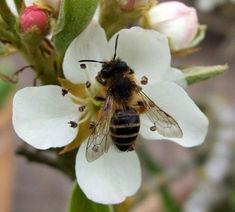
Scientists at East Malling Research (EMR) have welcomed the announcement of £10 million to boost research to try and halt the declining number of bees and other pollinating insects.
Experts at EMR are hoping to work with other UK researchers to bid for part of the funds to address current and future pollination problems threatening apple, pear, cherry and plum orchards.
The UK has not yet suffered the colony collapse disorder experienced in North America but the number of honeybees in the UK has fallen by 15 per cent in the past two years. In addition, numbers of other pollinators, such as wild bees, hoverflies and butterflies, also appear to be in decline.
The research funding is being made available by the government, which is working in partnership with the Biotechnology and Biological Science Research Council (BBSRC), the Natural Environment Research Council (NERC), the Wellcome Trust, the Scottish government and the Welsh Assembly government.
EMR entomologist Dr Michelle Fountain is keen to see research progressed as quickly as possible to avert a lack of successful pollination of fruit and other key crops.
She said: “The way bees are managed in the US is quite different from the UK approach and, so far, the problems we are seeing with honeybees here are not as dramatic as on the other side of the Atlantic.
“However, it is clear that our hives are being significantly weakened, with up to half of the UK-managed honeybee colonies dying over the winter - probably as result of a combination of complex factors, including a variety of pest and diseases, loss of important natural floral resources, and the inappropriate use of pesticides.
“While honeybees are very important for crop pollination we also need a greater understanding of other potential managed and wild bee pollinators.
“With top fruit, one of our key areas of expertise at EMR, it is possible that we could exploit the use of solitary Mason bees with a system developed by Robin Dean, of CJ Wildbird Foods, to enhance pollination in orchards.
“These bees are extremely effective at pollinating blossoms. We often see them in our own gardens in early spring as they are more active early in the season than honeybees.
“Working in partnership with complementary specialists at other institutions, Dr Simon Potts, head of the Pollination Research group at the University of Reading, and Robin Dean, of CJ Wildbird Foods, we can investigate ways of increasing the numbers of solitary bees and other naturally occurring pollinators in orchards in order to produce Class I fruit.
“Native bees thrive while pollinating our fruit trees but they need other sources of pollen nearby to sustain them through the summer months when the apple, cherry and pear blossom has long gone.
“By identifying more clearly the range of plants and habitats these insects require, we will be able to assist fruit growers to manage their hedgerows and broader landscapes to increase fruit pollination,” added Fountain.